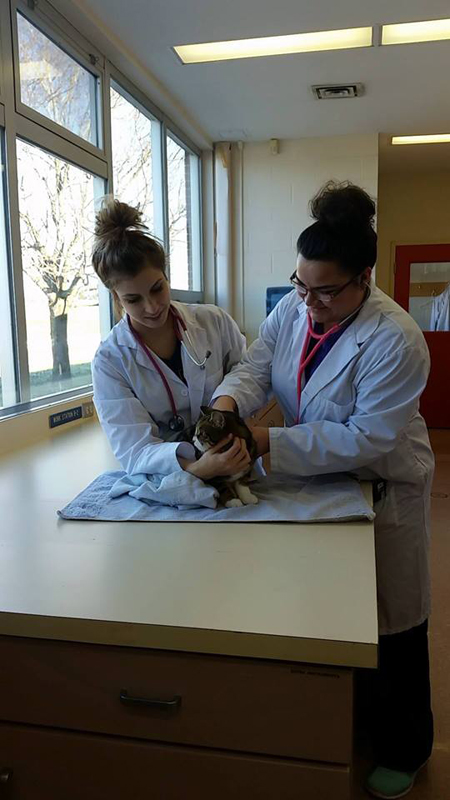News
» Go to news mainBecause Every Cat Matters
Because Every Cat Matters
300 Felines: Where are they now?
By Katherine Doyle
300 Felines is a student run, volunteer based project working to help the feral cat population in the Cumberland Colchester region. Lindsay Russell and Taylor Jacobs are Co-Leads of the 300 feline project and two of the countless volunteers dedicating their time to help these furry felines.
“Each of us involved in 300 Felines has cared for, adopted and/or worked with feral cats. We see the toll that the difficult conditions under which they live take on their health and well-being. We are grateful for the opportunity to contribute to a cause for which we are deeply passionate, in collaboration with regional non-profit animal welfare organizations,” the girls added. “We recognize the need in our community for a proactive approach to humanely address the feral cat overpopulation crisis and we are in a position to help make a difference.”
 Since launching in the fall, 300 Felines has held countless successful fundraisers and have begun planning additional fundraising events for the coming months. In addition, the team conducted community outreach which lead to the successful completion of its crowd-funding campaign to raise $10, 000 on Dec. 18, 2015.
Since launching in the fall, 300 Felines has held countless successful fundraisers and have begun planning additional fundraising events for the coming months. In addition, the team conducted community outreach which lead to the successful completion of its crowd-funding campaign to raise $10, 000 on Dec. 18, 2015.
Dr. Lori Parsons, Director of the Veterinary Technology program, expressed her enthusiasm over the fundraising efforts. “It has been a great experience for students so far, as they have launched several great fundraising initiatives towards this great cause,” Dr. Parsons added. “The funds raised will pay for each feral cat procedure so more money raised means we can help more cats.”
Apart from paying for the procedure, the money raised will also fund the purchase of medication, extra equipment and supplies, as the cats receive any other healthcare they may need during their visit.
The team has established partnerships with several non-profit animal welfare organizations in the region, Colchester Municipality and local businesses. The animal rescue organizations have been carefully chosen, and will be the ones bringing the feral cats in to the students and volunteers.
The rescue partners will be determining which cats qualify for this program. There are many different factors that are taken into consideration when looking for cats that qualify. One of the biggest components they look at is urgency.Ěý “A colony of 100 cats probably needs to be addressed first versus an area with a couple of cats due to the overall impact on the population i.e. trying to prevent or control a population explosion," Parsons explains.
The rescue partner must also ensure that the cat is truly “feral” and not someone’s pet, as this program is specifically for the feral cat population.
Beginning this spring, 300 felines will open their clinic doors. The clinical work and procedures will be conducted by veterinary professionals, vet tech faculty and students all of who are volunteering their time. With the goal to spay/neuter and provide health care to 300 feral cats over the next three years.
“The 300 Felines team is grateful to all who contributed to the success of our crowd-funding campaign; you have given the gift of feline healthcare because you too, recognize that every cat matters.Ěý Each cat who is spayed/neutered and provided with veterinary care is one more life improved.”
Be sure to follow their Facebook page for project updates!
Ěý
Recent News
- Holiday Hours
- From Academia to Agriculture: Former PhD student and supervisor launch innovative vertical farming venture
- Community Representative ‑ Animal Care and Use
- New Face on Campus
- Sowing Seeds of Knowledge: A Gardener’s Journey with DeAnne Pelchat
- şÚÁĎłÔąĎÍřAdvising Summit
- Legacy Awards 2024
- Regenerative Agrourbanism
